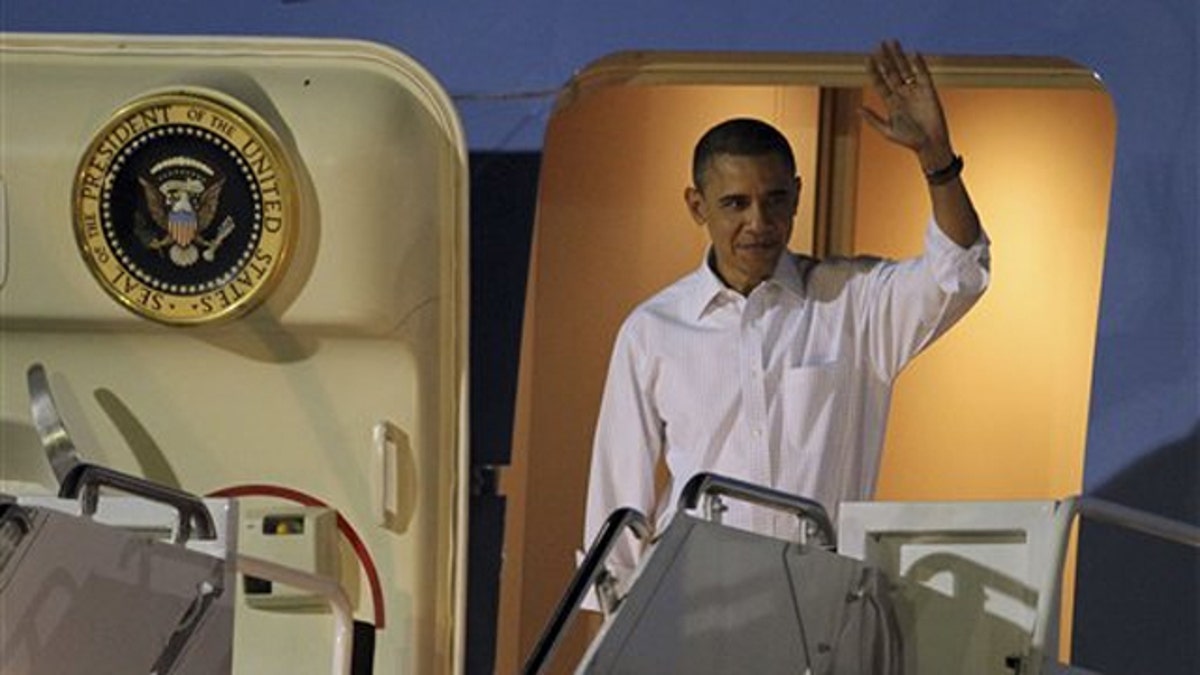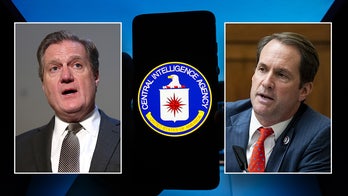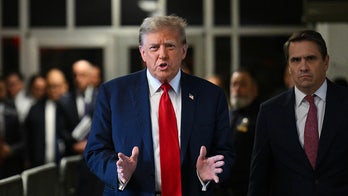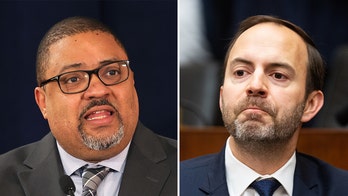
President Obama arrives at Hickam Air Force base in Honolulu, Hawaii, on Dec. 22. (AP)
President Obama has outraged Republicans by directly appointing six officials this week without the consent of Congress, including his pick for deputy attorney general, who once compared the Sept. 11, 2001, terror attacks to the drug trade.
The president announced the so-called recess appointments Wednesday, using his power to install sidelined nominees while Congress is on break. They will still need to be confirmed by the Senate before the end of the next session, but the recess appointments allow Obama to break a series of logjams and fill positions that have been vacant for months.
Obama appointed four new U.S. ambassadors, along with the U.S. public printer and the deputy attorney general.
The latter, James Cole, had been in limbo since he was nominated in May, though his name did clear the Senate Judiciary Committee over the summer. Republicans had questioned his past consulting work with bailed-out insurance giant AIG but had been particularly critical of his stance on prosecuting terror suspects.
That concern flared up again after Obama installed Cole on Wednesday. Rep. Peter King, R-N.Y., incoming chairman of the House Homeland Security Committee, accused Cole of wanting to pursue terror suspects as a criminal matter in civilian courts. He cited a 2002 Legal Times column in which Cole called the Sept. 11 attacks "criminal acts of terrorism against a civilian population" -- like the Oklahoma City bombing.
Cole went on to write that the United States has faced "many forms of devastating crime," from the drug trade to organized crime to rape and child abuse. "The acts of Sept. 11 were horrible, but so are these other things," he wrote.
King said Cole's appointment indicates the administration wants to continue to implement "dangerous policies" of treating terrorism as a criminal issue. Attorney General Eric Holder, Cole's new boss, has pushed for criminal trials but has struggled to bring mastermind Khalid Sheikh Mohammed stateside for prosecution.
"I find it absolutely shocking that President Obama would appoint someone who has diminished the 9/11 terrorist attacks by comparing them to the drug trade and who believes that a civilian courtroom is the appropriate venue for 9/11 trials," King said in a written statement. "I strongly oppose the recess appointment of James Cole to lead the national security team at the Department of Justice."
But Sen. Patrick Leahy, D-Vt., chairman of the Senate Judiciary Committee, applauded Obama for breaking through and filling the critical deputy position at the Justice Department.
"Despite repeated requests, for more than five months, Senate Republicans refused to debate the nomination of Jim Cole to be the deputy attorney general. I have no question that Jim Cole is highly qualified to fill this vital law enforcement post," Leahy said. "The delays in considering his nomination were unnecessary and wrong."
According to the White House, Cole's nomination sat on the Senate floor for 155 days, longer than any deputy attorney general nominee since the Reagan administration.
Cole previously served in the Justice Department for more than a dozen years before heading into private practice in 1992. He also served on former President Bill Clinton's transition team in 1992.
Not counting the most recent additions, Obama has made a total of 22 recess appointments this year, six of which have since been confirmed by the Senate.
Obama also announced envoy appointments Wednesday for Azerbaijan, Syria and NATO allies Turkey and the Czech Republic.
Specific senators had blocked or refused to consider the confirmations of the nominees for various reasons, including questions about their qualifications. But in the most high-profile case, that of the new envoy to Syria, Robert Ford, a number of senators objected because they believed sending an ambassador to the country would reward it for bad behavior.
"Making underserved concessions to Syria tells the regime in Damascus that it can continue to pursue its dangerous agenda and not face any consequences from the U.S.," Republican Rep. Ileana Ros-Lehtinen, the incoming chairwoman of the House Foreign Affairs Committee, said in a written statement. "That is the wrong message to be sending to a regime which continues to harm and threaten U.S. interests and those of such critical allies as Israel."
The administration had argued that returning an ambassador to Syria after a five-year absence would help persuade Syria to change its policies regarding Israel, Lebanon and Iraq as well as its willingness to support extremist groups. Syria is designated a "state sponsor of terrorism" by the State Department.
Former President George W. Bush's administration withdrew a full-time ambassador from Syria in 2005 after terrorism accusations and to protest the assassination of former Lebanese Prime Minister Rafik Hariri, killed in a Beirut truck bombing that his supporters blamed on Syria. Syria denied involvement.
Obama nominated Ford, a career diplomat and a former ambassador to Algeria, to the post in February, but his nomination stalled after his confirmation hearings and was never voted on.
The other Obama nominees announced Wednesday are Matthew Bryza for Azerbaijan, Norman Eisen for the Czech Republic and Francis Ricciardone for Turkey.
Bryza, a career diplomat, was opposed by some in the Armenian-American community because of comments he made in his previous position as deputy assistant secretary of state for European affairs while trying to negotiate an end to the Nargorno-Karabakh conflict between Armenia and Azerbaijan.
The nomination of Ricciardone, another career diplomat who served as ambassador to Egypt during the Bush administration, had been held up by outgoing Sen. Sam Brownback, a Republican from Kansas, who had concerns about his work in promoting democracy while he was stationed in Cairo.
The nomination of Eisen, a lawyer who has worked in the Obama White House on ethics and reform, was being held up by Sen. Charles Grassley, an Iowa Republican who said the nominee had made misrepresentations to Congress about the firing of a federal official.
The Associated Press contributed to this report.




